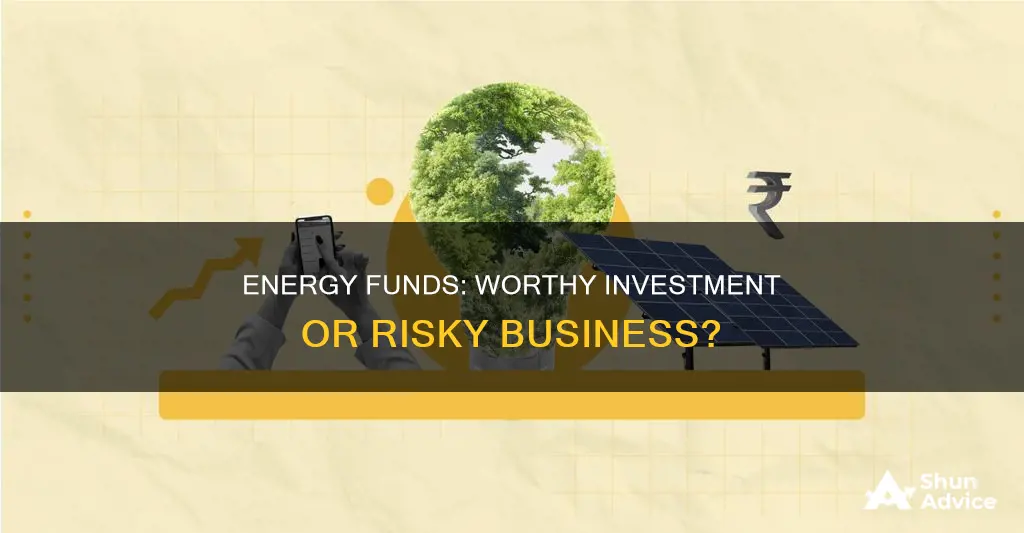
Energy funds are a hot topic for investors, especially with the current focus on renewable energy sources and the transition to net-zero. Energy stocks can be volatile, and while they can be a lucrative investment, they also carry a high level of risk. So, should you invest in energy funds?
Energy funds can be a good way to diversify your portfolio, especially as renewable energy sources become more affordable and widely adopted. Solar and wind power, for example, have been expanding much faster than natural gas-fired generation in the US, while the use of coal continues to decline. This shift towards renewable energy sources is expected to continue, with the US Energy Information Administration forecasting a 75% growth in solar power generation and an 11% increase in wind power between 2023 and 2025.
However, investing in individual energy stocks can be challenging and time-consuming. It requires a good understanding of the industry and the specific companies you're investing in. As an alternative, you could consider investing in exchange-traded funds (ETFs) or mutual funds that focus on the energy sector. These funds offer the benefits of a diversified portfolio while still allowing you to invest in the energy sector.
Ultimately, the decision to invest in energy funds depends on your individual financial goals, risk tolerance, and investment horizon. It's always a good idea to do your own research and consult with a financial advisor before making any investment decisions.
What You'll Learn

The pros and cons of investing in renewable energy
Pros
- Renewable energy sources will not run out, unlike fossil fuels.
- Renewable energy systems have lower maintenance requirements than traditional fuel sources.
- Renewable energy can save money in the long term, with lower maintenance and operating costs.
- Renewable energy has numerous environmental benefits, including lower greenhouse gas emissions, cleaner water and air, and less waste.
- Renewable energy can lower reliance on foreign energy sources and contribute to energy independence and security.
- Renewable energy creates jobs and can boost the economy.
- Renewable energy leads to a healthier environment and can improve health outcomes.
- Renewable energy investments can be diversified, reducing risk.
- Renewable energy is becoming more affordable, with the price of solar energy and panels dropping.
- Investing in renewable energy can help diversify your portfolio.
Cons
- Renewable energy has high upfront costs.
- Renewable energy is intermittent and relies on weather conditions, unlike fossil fuels, which can be used at any time.
- Renewable energy has limited storage capabilities, and storage technologies can be expensive.
- Renewable energy sources have geographic limitations and may not be suitable for all locations.
- Renewable energy is not always 100% carbon-free, as the manufacturing, transportation, and installation of renewable energy infrastructure can create a carbon footprint.
- There may be barriers to entry for individual investors, such as accreditation requirements or the need for a retail broker.
- Information about potential renewable energy investments may be difficult to find and unbiased.
- Opposition to renewable energy projects from local residents can sink a project.
- Large solar arrays need significant space, which can disrupt animal habitats and cause other problems.
Bond Fund Strategies: Dynamic Investing for Maximum Returns
You may want to see also

The performance of energy stocks
Looking at specific energy stocks, Targa Resources (TRGP), The Williams Companies (WMB), Diamondback Energy (FANG), and Marathon Petroleum (MPC) were among the best-performing energy stocks as of September 2024.
When considering the performance of energy stocks, it's worth noting that the industry is subject to significant fluctuations due to various factors such as commodity prices, geopolitical tensions, and industry-specific risks. For example, renewable energy stocks have begun to stage a comeback as inflation eases and interest rates are expected to be cut. Additionally, the use of coal continues to decline, while solar and wind power generation expand.
It's also important to keep in mind that stock performance is just one data point, and that investing in individual stocks, especially in the energy sector, can be challenging. Investors need to understand industry dynamics and the specific exposure of each company. Diversification is key, as it can help protect against company-specific risks but may not shield against industry-wide risks, such as declining oil prices.
Closed-End Funds: When to Invest for Maximum Returns
You may want to see also

The risks of investing in energy funds
The energy sector is undergoing a period of significant change and uncertainty, which has made it more challenging to invest in compared to the past when it offered predictable returns. The transition to renewable energy sources, such as solar and wind power, has led to a decline in the use of traditional energy sources such as coal and natural gas. While renewable energy has vast potential and is expected to continue growing, there are several risks associated with investing in this sector.
Firstly, renewable energy stocks have shown mixed results in recent months, with some funds underperforming or experiencing declines. For example, solar energy stocks have dimmed from their 2021 highs, and issues such as interest rates and tariffs have impacted sales. Additionally, the cost of renewable energy installations has increased due to supply chain disruptions and inflation.
Secondly, the energy sector is heavily regulated, and companies in this industry face the challenge of adapting to changing policies and technologies. For instance, the transition to green energy requires a significant overhaul of infrastructure, which can be costly and time-consuming. The cost of rewiring the electricity grid and future-proofing water networks will be astronomical, and it is likely that investors will have to foot the bill.
Thirdly, there is a risk of misinformation and disinformation about renewable energy, which can undermine the transition and impact investment decisions. As the industry evolves, it can be challenging to discern the real trajectory and potential of clean energy alternatives compared to the "hype" surrounding them.
Lastly, investing in individual energy stocks carries inherent risks, and it is important to conduct thorough research before making any investment decisions. It is crucial to consider factors such as the company's track record, annual revenue, and ESG (environmental, social, and governance) score. Diversification is also key to reducing risk, and investors should consider investing in mutual funds or exchange-traded funds (ETFs) that offer exposure to a range of energy companies or sectors.
In conclusion, while there are risks associated with investing in energy funds, particularly in the renewable energy sector, these risks can be mitigated through careful research, diversification, and a long-term perspective.
Index Funds: Diversified, Low-Cost, Long-Term Investment Strategy
You may want to see also

The potential for growth in the energy sector
The energy sector has experienced rapid growth in recent years, and this trend is expected to continue in the future. Here are some key factors highlighting the potential for growth in the energy sector:
Renewable Energy Transition
The shift towards renewable energy sources is a significant driver of growth in the energy sector. Solar and wind power generation have been expanding much faster than natural gas-fired generation, while the use of coal is declining. This trend is expected to continue, with the U.S. Energy Information Administration projecting a 75% growth in solar power generation and an 11% increase in wind power between 2023 and 2025. The falling costs of renewable energy technologies, such as solar and wind, have made them more cost-competitive with fossil fuels, driving their increased adoption.
Government Policies and Investments
Government policies and investments have played a crucial role in supporting the growth of the energy sector. For example, the U.S. government provided over $30 billion in renewable energy tax credits, grants, and loans in response to the global financial crisis. Additionally, the Inflation Reduction Act of 2022 was expected to boost renewable energy investments further. The International Solar Alliance, launched in 2015, also promotes solar energy among countries with high solar power potential. These policies and investments create a favourable environment for the development and adoption of renewable energy technologies.
Energy Efficiency and Electrification
Improving energy efficiency and electrification, particularly in developing countries, offers significant growth potential for the energy sector. Scaling up renewable energy and energy efficiency investments is crucial to meeting climate goals and providing clean energy access to underserved communities. The World Bank, for instance, has committed to providing access to electricity to 300 million people in Africa by 2030 through its Mission 300 initiative. These efforts not only contribute to sustainability goals but also create new jobs and drive inclusive growth.
Energy Storage and Grid Modernization
The development of energy storage technologies, such as battery storage, and the modernization of the electric grid are essential to accommodating the increasing adoption of renewable energy sources. The World Bank has mobilized approximately $850 million in global climate financing for battery storage and energy storage deployment projects. These investments in energy storage solutions enhance the reliability and stability of the energy sector, making it more resilient to fluctuations in renewable energy production.
Job Creation
The energy sector has been identified as a significant source of job creation, particularly in the post-pandemic era. According to the U.S. Department of Energy, the energy sector added back 560,000 jobs in 2020, even amidst the economic losses due to the COVID-19 pandemic. This rebound in energy sector employment highlights the potential for job growth in the industry, which is expected to continue with further investments and economic recovery.
Mutual Funds and 401(k)s: A Dynamic Retirement Savings Duo
You may want to see also

The role of energy funds in a diversified portfolio
Energy funds can play a crucial role in a well-diversified investment portfolio. They offer investors exposure to the dynamic and essential energy sector, providing an opportunity to capitalize on the growth and innovation in this field. Here's how energy funds can fit into a diversified portfolio:
- Sector Diversification: Investing in energy funds allows investors to diversify their portfolios across different sectors. The energy sector, which includes oil and gas, renewables, power, and infrastructure, is a vital component of the global economy. By investing in energy funds, individuals can gain exposure to a range of energy-related industries, reducing the concentration of their investments in any single sector. This diversification can help mitigate risks associated with sector-specific downturns or shocks.
- Risk Mitigation: Energy funds can provide a level of risk mitigation within a portfolio. While all investments carry some level of risk, diversifying across various energy sources and technologies can help lower the impact of any single investment on the overall portfolio. For example, investing in renewable energy funds can balance out the risks associated with traditional fossil fuel investments, which are subject to volatile commodity prices and increasing regulatory pressures.
- Long-Term Growth Potential: The energy sector is undergoing significant changes and advancements, presenting long-term growth opportunities. Renewable energy sources, such as solar and wind power, are expanding rapidly and are expected to play an increasingly important role in the global energy mix. Energy funds provide investors with a way to tap into this growth potential, offering access to companies driving innovation and development in these areas.
- Inflation Hedge: Energy funds can also serve as a hedge against inflation. Energy prices, particularly those of fossil fuels, tend to be influenced by global economic conditions and inflationary pressures. Investing in energy funds can provide a level of protection against the erosive effects of inflation on an investment portfolio, as energy prices often rise during inflationary periods.
- ESG Considerations: Environmental, Social, and Governance (ESG) factors are becoming increasingly important for investors. Energy funds, especially those focused on renewable energy and sustainable practices, can align with investors' values and contribute to positive environmental impact. By investing in these funds, individuals can support the transition to cleaner energy sources while potentially benefiting from the growth of this sector.
- Actively Managed Funds: Energy-focused mutual funds or exchange-traded funds (ETFs) are often actively managed by fund managers who have expertise in this sector. They can leverage their knowledge to identify promising investments and navigate the complexities of the energy industry. This active management can be advantageous, especially for individuals who may not have the time or expertise to research and select individual energy stocks.
When considering energy funds for a diversified portfolio, it is essential to assess your investment goals, risk tolerance, and time horizon. Conduct thorough research, compare different funds, and seek professional advice to ensure that your investment decisions align with your financial objectives and values.
Shares vs Mutual Funds: Where Should You Invest?
You may want to see also
Frequently asked questions
Investing in renewable energy can help diversify your portfolio, especially when oil and other traditional energy resources are volatile. It can also be a way to support the environment and create new industries.
Examples of renewable energy stocks include Constellation Energy Corporation, Eco Wave Power Global AB, and Brookfield Renewable Corporation.
ESG funds are mutual funds that are graded based on environmental, social, and governance factors. They provide an easier way to invest in renewable energy by offering a diversified basket of stocks across multiple clean energy companies.
It's important to consider your existing portfolio allocation and the types of investments you already have. Research the company's track record, annual revenue, and ESG score before investing. Understand the specific exposure and dynamics of the energy industry and the potential risks involved.
Yes, if you don't want to invest in individual stocks, you can consider exchange-traded funds (ETFs) or mutual funds that focus on the energy sector. This provides diversification and potentially lower fees, but it's still important to analyse the underlying companies and the drivers of investment returns.







